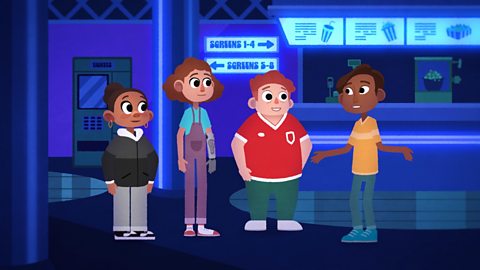Sujit:Faster, come on!Yes! Aahh! No!
Dylan:Aahh! Dynamic Stink areplaying.
Sujit:Get tickets! Get tickets!
Dylan:Dynamic Stink are the best band. They’re not on sale yet. Oh andand and and and they’re they’re £24.50
Sujit:Yeah well there’s no way my parents will take me anyway.
Dylan:I’ll ask my mum.
Sujit:Left left left left,Ohh.
Dylan:She’ll take us but we have to pay for our own tickets.
Sujit:Oh yeah,gonna get our Dynamic Stink on.
Dylan:We’ve got to find the money first.
Sujit:No problem, I will pay for for mine…on my card.
Dylan:What? How did you get a credit card?
Sujit:It’s not a credit card, it’s a debit card.
Dylan:What’s the difference?
Sujit:Remember when Ash got all that new stuff last summer?
Dylan:Ash is Sujit’s older brother. He always has loads of money.Yeah he bought the same pair of trainers in five colours just to see ifthey felt different.
Sujit:Yeah well he bought all that on a credit card. They let him borrowmoney and pay it back each month. Only if you don’t pay it allback they charge you more. So now Ash is working all the time topay back all the money he spent. And more on top.
Dylan:That’s rubbish.
Sujit:My parents were so angry. They got me this debit card. I can onlyspend money that is in my account and they can see what I spendit on.
Dylan:How much have you got?
Sujit:I get £7 a week. How much have you got?
Dylan:Sujit gets given money from his parents but I have to earn it. Hestill hasn't got any money half the time though. I dunno, I’ll checkwhen I get home. Okay £13.10. That means I need another anotheranotheranother £11.40. More if I want to get some merch.Ok Jobs, jobs, jobs Wash thecar, washing up, take the bins out, ewwww.
Sujit:Hey, have you got the money for the gig yet?
Dylan:Almost, I had 13 so I needed like 12 more. I have that but I wantto get another tenner so I can get a a t-shirt. Have you got yours?
Sujit:
Yeah, it’s been 5 weeks and I get £7 a week so so that’s £35, shouldbe plenty. Oooo invincibility for the rest of this level, let’s get it.
Dylan:Hmm £1 let me check.
Sujit:You are such a geek with this stuff.
Dylan:Yeah, yeah.Tickets go on sale at at 9am tomorrow. I’m giving my money tomy Mum tonight.
SujitI’ll call you, let’s do it together. Are youin?
Dylan:I’m in the queue. No, hang hang on. I’min. You?
Sujit:Yes.Go!
Dylan:Ok, I’m done…I think. Yes.
Sujit:Me Me too… just…what! Hey, it’s not working.
Dylan:Have you got enough money on it?
Sujit:My mum must have forgotten to put the money in. Let me look.Oh, aagh, oohh. aagh!
Dylan:Hey. What happened? Did you get get it?
Sujit:A-a-a-argh!
Video summary
This animated video demonstrates the importance of keeping a record of what we spend and save to helps us to stay in control of our money.
Sujit and Dylan want to go and watch their favourite band but need to save up enough money to afford tickets.
Sujit gets a weekly allowance added to his debit card by his parents while Dylan has to complete household chores to earn enough.
Dylan is careful with his spending but Sujit makes impulsive purchases when gaming, which means he can't afford to get the gig tickets.
This video is from the series Financial education.
Teacher Notes
Central or big idea
Keeping a record of what we spend and save helps us to stay in control of our money.
Questions to explore
- Why might keeping a record of what you save and spend be helpful?
- What are some ways you might keep a record of your spending and saving?
- How does a bank account help you to keep track of your savings and spending?
- What is the difference between a debit card and a credit card?
Key learning outcomes (Young Enterprise Financial Education Planning Framework)
9-11 - Upper KS2
- I can use simple financial information to plan and manage a basic budget and keep track of my spending.
- I know I need to check and keep basic financial information e.g. receipts, bills, bank statements.
- I understand that planning my spending helps me to stay in control of my money.
7-9 - Lower KS2
- I understand the reasons for using different forms of payment including the difference between debit and credit cards.
- I know some different ways of keeping track of my money e.g. counting, keeping receipts.
- I can plan and track my saving and spending by keeping simple records.
- I understand why it is important to keep track of my saving and spending.
Key vocabulary and definitions
- Debit card: A plastic card that can be used to purchase goods and services. The money spent will come straight out of your bank account.
- Credit card: A small plastic card available to 18 year olds and older from most banks, which allows you to borrow money up to a certain limit. When you buy something with your credit card, the amount you spend is added to your total borrowing. Every month you are sent a statement to show how much you have borrowed and how much you need to repay. If you don’t repay the full amount, you will start paying interest.
- A (financial) record: Document which summarises saving and spending or other financial transactions (borrowing and lending)
- Budget: a plan for saving and spending
- Tenner: ten pounds
Suggested activities
Understanding a financial record:
- Pause the video showing Sujit and Dylan’s spending (or provide children with screen grabs). Explore the following questions:
- How did Dylan and Sujit keep track of their spending?
- What did Dylan do that was different to Sujit?
- Whose approach might you take? Why?
Exploring the impact of Dylan and Sujit’s decisions and other scenarios:
- Working in pairs to role play or creating a storyboard ask children to consider what could Sujit could have done so that he could afford the ticket in the end (e.g. not have spent money on other things, tracked his spending more often/carefully). Then to explore what might Dylan and Sujit do next to enable them both to go to the concert (e.g. buy cheaper tickets, borrow the money from a parent).
Keeping a simple financial record:
- Plan an activity for children to manage a simple budget with a set amount of money, including buying items (for a party for example) and items to save for.
Ideas for going further
- Investigate what type of bank accounts and bank cards children under 12 are legally allowed to have.
- Why might this be the case? Why might it change as you get older?
Links to other BBC resources
1. Money and how we pay for things: bartering to online banking. video
This video explains how the ways that we pay for goods and services has changed over time.
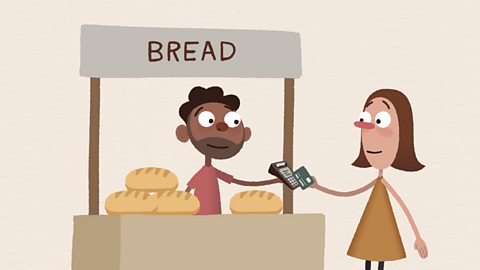
2. Spending versus saving, and needs versus wants video
This video looks at how we have choices to make about how we spend and save our money.
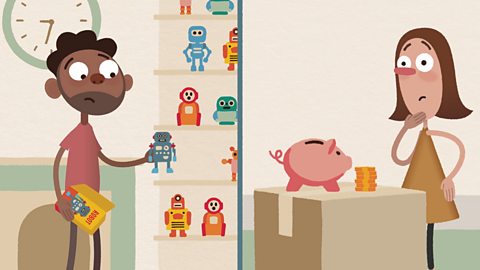
3. Influencers: how they can affect our spending. video
Spending money can be influenced by other people, including friends and online influencers.
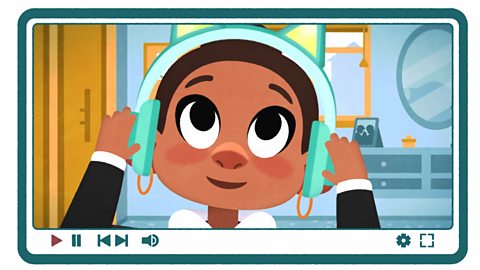
4. Helping others through actions, donations and spending. video
The impacts of helping others (by sharing, donating money or certain purchasing choices).
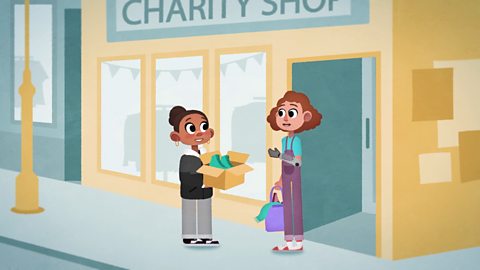
6. Advertising: how it can affect my buying choices. video
Advertisements can influence the decisions we make about how to spend our money.
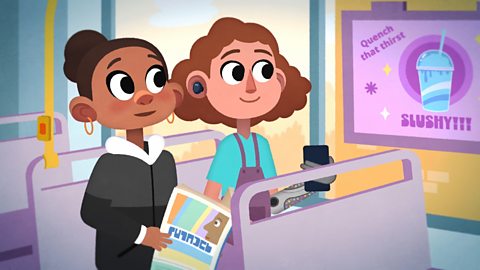
7. Gaming payment models. video
A look at gaming payment models: subscription, upfront and in-game purchases.
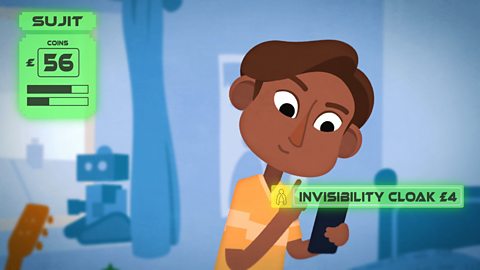
8. Online scams: protecting my money and personal details. video
A look at online scams – online scammers might appear to be connected to someone we know, but always check with the person offline to be sure.
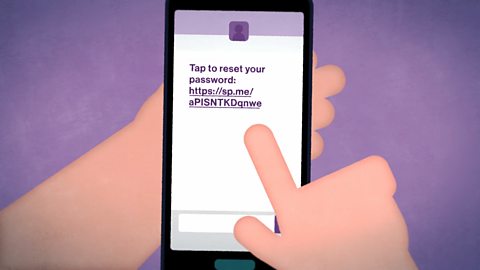
9. Saving and borrowing: the costs and benefits of interest. video
Interest is money which can be added to the money that we save or borrow.
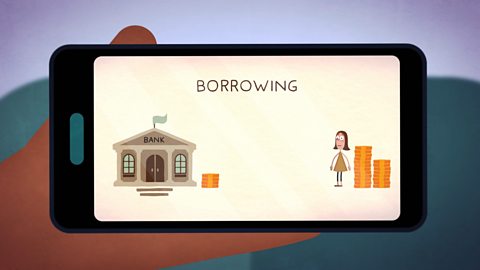
10. Jobs: the link between work and money. video
We can earn money by having a job and different jobs pay different amounts.
